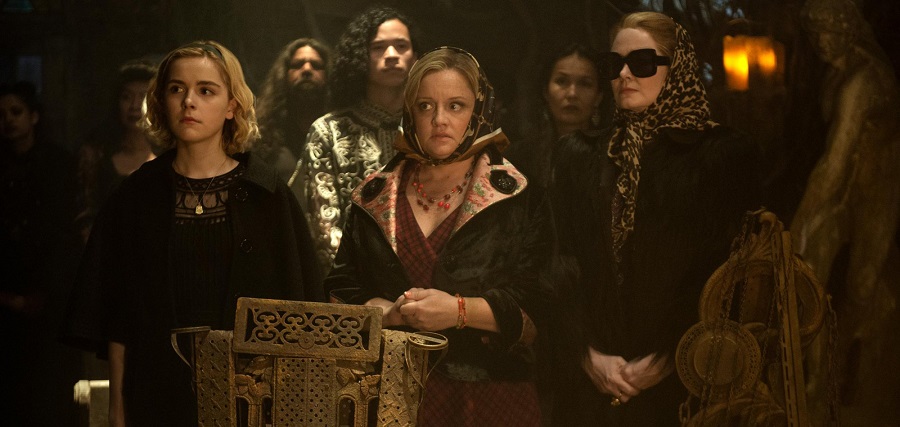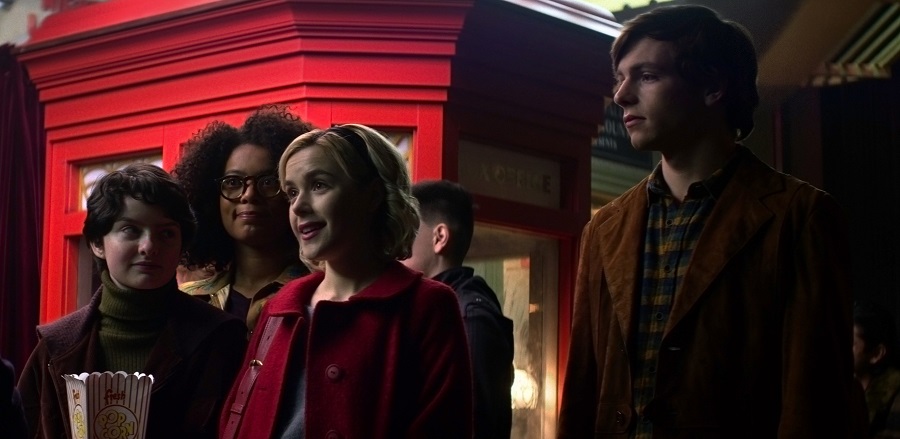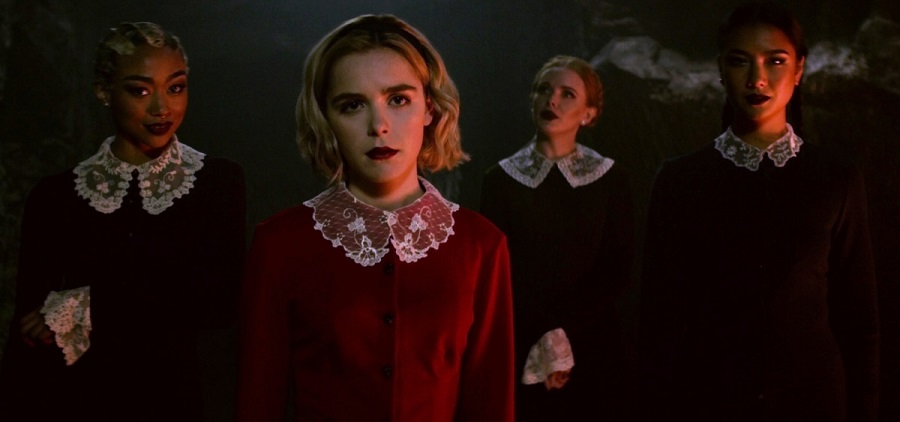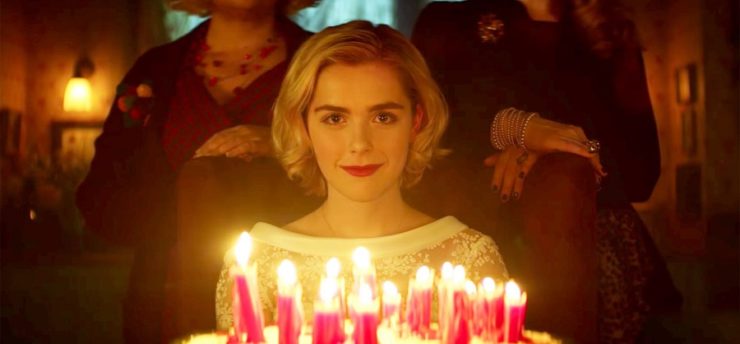It took me a grand total of one episode for Chilling Adventures of Sabrina to hex me into obsession. Based solely on my love of the comic from which the show was adapted, I knew going in that I’d like it. But my preemptive affection turned into post-binge adoration with the show’s twisted sense of humor, campy sense of horror, and willingness to engage with social justice issues, not to mention the fantastic cinematography, direction, and acting.
So let’s take a look at my latest addiction that I’m sorely tempted to go back and rewatch next weekend.
Some spoilers.
As a half-witch, Sabrina was raised in the human world by her witch aunts and cousin. On her sixteenth birthday, she’s forced to make a choice: live as a mortal or become a full-fledged witch. The former means never achieving her magical potential while the latter means giving up her friends and human life. If she signs her name in the Book of the Beast, she’ll have access to more power than she can imagine, but she’ll also be beholden to Satan himself. Sabrina insists on having both power and freedom, but the other women in her life, human and witch alike, know she’ll have to choose.
For most of the season, Sabrina gets lucky. She crosses line after line, challenging and rejecting human and occult social norms when they conflict with her own sense of justice. But because others more powerful than she step in to guide the circumstances and protect her, Sabrina is spared the consequences of her actions. Until the last few episodes, that is. Everything has a cost. Sabrina can pay for power by surrendering her free will or keep her freedom in exchange for being able to use magic to help those she loves. When the entire town is threatened by an unstoppable evil, she can put off her decision no longer.
Bringing all this gothic storytelling to life is a fiery cast of actors. Kiernan Shipka brings a disconcerting blend of twee charm and devilish gravitas to Sabrina. Miranda Otto and Lucy Davis turn Zelda and Hilda Spellman into quirky and complicated sisters who looked at Sam and Dean Winchester’s damaging codependency and said “hold my beer.” I have loved Michelle Gomez since her Green Wing days, and she’s perfectly macabre as ally/enemy Mary Wardwell.
Adeline Rudolph (Agatha), Abigail Cowen (Dorcas), and Gavin Leatherwood (Nick) may be relative newcomers to television, but you wouldn’t know it from their work here. Grounding them is the formidable Tati Gabrielle, who takes Prudence’s scenery chewing dialogue and layers it with subtext and double entendres. At first it seems like Ross Lynch doesn’t have the range of his co-stars, but by the end of the season it’s clear he’s playing a long game with Harvey’s cluelessness. What the script lacks in character development for Susie and Roz, Lachlan Watson and Jaz Sinclair make up for with sheer talent. Richard Coyle (Father Blackwood) and Bronson Pinchot (Principal Hawthorne) don’t get much to do beyond being sexist and hammy, but they do it with flair. And Chance Perdomo (Ambrose), my sun and stars!

Look, as much as I love this show, it’s tone deaf in some key areas. The first is the excessively obvious ways the show tackles the patriarchy. Sabrina has a lot to say about shitty men and the women who support them, but it’s nothing we haven’t seen before. The show hints at bigger ideas – particularly with Sabrina’s refusal to conform to witch law, Miss Wardwell dealing with the unearned confidence of mediocre men, Susie as a potentially non-binary character, and Harvey rejecting toxic masculinity – but fails to actually do something with them. In a post November 2016 world, I expect the feminist politics of a prestige streaming show to be more than teen girls confronting their sexist principal and a femme fatale using sex appeal to scam men.
Race is also largely ignored, to the detriment of the show. On the surface, the show’s feminism lite unites the girls and women under a single banner of “feminist,” but on a deeper level it wholly disregards the constraints of misogynoir and microaggressions Black women deal with that white women do not. Just as bad, Ambrose as a queer Black man gets no racial context at all.
You can argue all you want that witch society wouldn’t have the same racist hang ups as muggles, but they came to America a decade after the first enslaved Africans were brought ashore. Witches have all of western society’s sexism, but you’re telling me they avoided racism, a trait so fundamental to American society that we built it into our constitution and fought a whole damn war over it? They had a episode about Greendale ancestors without discussing how Roz’s people arrived in the first place. Were the Walkers enslaved by Greendale settlers, freed people who relocated to the area, or Atlantic Creole settlers? These answers all come with different baggage and give viewers different background information.

Speaking of Black people, I have a MAJOR problem with that lynching scene. I can’t believe I have to say this in the year of our goddess 2018, but come the hell on, Netflix! There is this thing called context. You can’t drop a scene like that and expect historical, social, and political context to not matter. It’s gross and offensive and decidedly not cool. Yes, I know the Greendale 13 were hanged and that the Weird Sisters were imitating that specific act of violence. However, I as a Black woman watching the show am connecting it with the real world. I was angry enough when Prudence tried to hang Sabrina, but when Sabrina (through her ghost gang) strung up three girls, two of whom are women of color, I had to turn off the TV and take a break.
Lastly, I’m still not sure how I feel about Sabrina’s presentation of queerness. On one hand, Ambrose is pansexual and the Weird Sisters and Nick Scratch are at the very least open to a variety of sexual experiences. Plus the casting of non-binary actor Lachlan Watson as Susie, a character questioning their gender identity! It’s not often a show will offer more than one type of queerness in the main cast. I know that Watson worked closely with showrunner Roberto Aguirre-Sacas in defining Susie and their transition, but I’m bothered by how the show stitches Susie’s story around sexual and physical assaults and transphobia. Worse, those incidents are used more as motivation for Sabrina than character development for Susie. Overall I think the rep is a net positive, but Sabrina is very close to falling into some harmful tropes.

Although they share a showrunner, Netflix’s Chilling Adventures of Sabrina is far less kitschy and flighty than its CW cousin, Riverdale. Yet Sabrina does retain the same otherworldly feel… as well as the scattershot tone. Sometimes Sabrina thinks it’s a teen drama, sometimes a classic monster movie, and other times a Very Serious Television Show. Fortunately for me, I didn’t mind the show wandering all over the place. Everywhere it went was somewhere I was willing to go.
Sabrina suffers the three common Netflix curses of two too many episodes, too many overstuffed subplots, and an inability to figure out what to do with them all. In spite of all that, I was rarely bored. It’s better than expected and not as polished as I’d hoped, but it’s a giggly, grotesque season of haunting visuals and uncomfortable moments.
If you want a great looking, strongly acted, and well-told story that’s heavy on social commentary and classic horror suspense, you can’t go wrong with Chilling Adventures of Sabrina. Now if you’ll excuse me, I have to go pester cosplay Twitter to find out where I can get Sabrina and Ambrose’s killer wardrobes.
Alex Brown is a YA librarian by day, local historian by night, pop culture critic/reviewer by passion, and an ace/aro Black woman all the time. Keep up with her every move on Twitter, check out her endless barrage of cute rat pics on Instagram, or follow along with her reading adventures on her blog.










